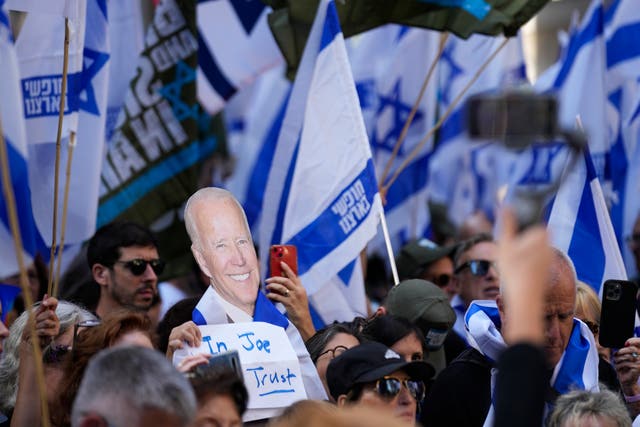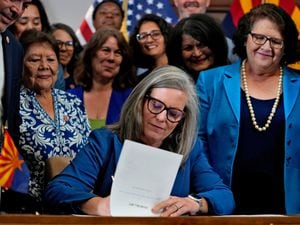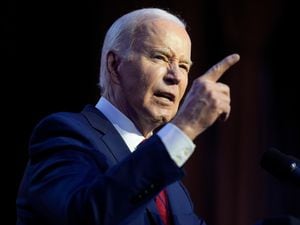Biden warns Netanyahu about the health of Israel’s democracy
The two leaders met on the sidelines of the UN General Assembly.

US President Joe Biden raised “hard issues” including protecting the “checks and balances” in a democracy, in a meeting with Israeli Prime Minister Benjamin Netanyahu.
He pushed Mr Netanyahu to find a compromise on a planned judicial overhaul that has set off protests in Israel and concerns in Washington.
The two leaders met on the sidelines of the UN General Assembly. It was their first meeting since Mr Netanyahu took office at the helm of his country’s far-right government late last year.
Mr Netanyahu tried to play down concerns at the start of the meeting about his contentious proposed judicial overhaul, saying there is “one thing that will never change and that is Israel’s commitment to democracy”.
Mr Biden opened the meeting by stressing the US friendship with Israel as being “ironclad” and saying that “without Israel, there’s not a Jew in the world who is secure. Israel is essential”.
But Mr Biden also acknowledged the tensions with Mr Netanyahu’s government and its policies.
“We’re going to discuss some of the hard issues, that is upholding democratic values that lie at the heart of our partnership, including the checks and balances in our systems,” Mr Biden said.
He said they would also talk about a path to a negotiated two-state solution with Palestinians and “ensuring that Iran never, never acquires a nuclear weapon”.
Mr Netanyahu stressed common goals in his opening remarks.
“Under your leadership as President, we can forge a historic peace between Israel and Saudi Arabia,” he told Mr Biden. Mr Netanyahu said he would uphold democratic values, despite his proposed changes to Israel’s court system.
Given the concerns about Mr Netanyahu’s commitment to democratic checks and balances, the setting of the meeting in Manhattan instead of the Oval Office was a sign of the strains in the alliance.
“Meeting at the White House symbolises close relations and friendship and honour, and the denial of that shows exactly the opposite,” said Eytan Gilboa, an expert on US-Israeli relations at Israel’s Bar-Ilan University.
“This is not going to be a pleasant meeting.”
Biden administration officials have repeatedly raised concerns about Mr Netanyahu’s contentious plan to overhaul Israel’s judicial system.
Mr Netanyahu says the country’s unelected judges wield too much power over government decision-making. Critics say that by weakening the independent judiciary, Mr Netanyahu is pushing Israel toward authoritarian rule.
His plan has divided the nation and led to months of mass protests against his government. Those demonstrations followed him to the US, with large numbers of Israeli expatriates waving the country’s flag in protest Wednesday in New York.

Hundreds of Israelis also protested outside the US Embassy in Tel Aviv on Wednesday.
Early this year, Mr Biden voiced his unhappiness over the judicial overhaul, saying Mr Netanyahu “cannot continue down this road” and urging the Israeli leader to find a compromise.
Mr Netanyahu’s negotiations with the opposition have stalled and his coalition has moved ahead with its plan, pushing the first major piece of the legislation through parliament in July.
The Israeli government’s treatment of the Palestinians has also drawn American ire. Mr Netanyahu’s coalition is dominated by far-right ultranationalists who have greatly expanded Israeli settlement construction on occupied lands claimed by the Palestinians for a future state.
Israel’s government also opposes a two-state solution between Israel and the Palestinians — a cornerstone of White House policy in the region. The deadlock has coincided with a spike in fighting in the West Bank.
The Biden-Netanyahu meeting came at a time of cooling ties between Israel and the Democratic Party. A poll by The Associated Press-NORC Center for Public Affairs Research found that while Americans generally view Israel as a partner or ally, many are questioning whether Mr Netanyahu’s government shares American values.
Republicans were significantly more likely than Democrats to call Israel an ally with shared values.
Tom Nides, who stepped down as US ambassador to Israel in July, said the timing and location of the meeting were issues and he acknowledged some policy differences.
“That’s what friends do. Friends argue with each other. We can articulate a strong view against settlement growth. We can say, quite frankly, arguably that they should get some compromise on judicial reform. What’s wrong with that?” Mr Nides said.
But he predicted a good meeting devoid of “fireworks,” noting that Mr Biden and Mr Netanyahu are longtime friends and the countries are still close allies. “The relationship is as strong as it has ever been,” he said.
Mr Netanyahu is expected to eventually get a White House invitation, though the timing of such a visit could depend on how the New York meeting went.
Topping Mr Netanyahu’s wishlist were discussions on US efforts to broker a deal establishing full diplomatic relations between Israel and Saudi Arabia.
Mr Netanyahu, who also led Israel when former president Donald Trump brokered the “Abraham Accords” between Israel and four Arab countries, has said that a similar deal with Saudi Arabia would mark a “quantum leap” forward for Israel and the region.
The White House has acknowledged that it is seeking such a deal, but obstacles lie in the way. Saudi Arabia is pushing for a nuclear cooperation deal and defense guarantees from the US.
The Saudis have also said they expect Israel to make significant concessions to the Palestinians.
Mr Biden was expected to make clear to Mr Netanyahu that any deal will need to consider Palestinian interests. Mr Biden understands that the Saudis are wary of proceeding with normalising relations with Israel at a time when it is led by the most right-wing government in its history, and when tensions have soared with the Palestinians.
The Saudi foreign minister, Prince Faisal bin Farhan, told reporters “there is no other way” to solve the conflict than by establishing a Palestinian state. But senior ministers in Mr Netanyahu’s government have already ruled out any concessions to the Palestinians.
Israel has also been eager to consult with the US about Iran, particularly over their shared concerns about Iran’s nuclear programme. Iran says the programme is peaceful, but it now enriches uranium closer than ever to weapons-grade levels.





